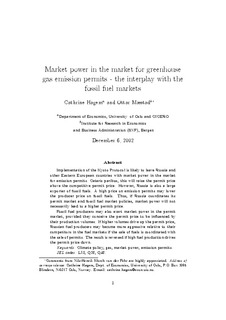| dc.contributor.author | Hagem, Cathrine | nb_NO |
| dc.contributor.author | Mæstad, Ottar | nb_NO |
| dc.date.accessioned | 2014-03-17T14:31:26Z | |
| dc.date.available | 2014-03-17T14:31:26Z | |
| dc.date.issued | 2002 | nb_NO |
| dc.identifier.issn | 0504-452X | nb_NO |
| dc.identifier.uri | http://hdl.handle.net/11250/192352 | |
| dc.description.abstract | Implementation of the Kyoto Protocol is likely to leave Russa and other Eastern European countries with market power in the market for emission permits. Ceteris paribus, this will raise the permit price above the competitive permit price. However, Russia is also a large exporter of fossil fuels. A high price on emission permits may lower the producer price on fossil fuels. Thus if Russia coordinates its permit market and fossil fuel market policies, market power will not necessarily lead to a higher permit price.
Fossil fuel producers may also exert market power in the permit market, provided they conceive the permit price to be influeneced by their production volumes. If higher volumes drive up the permit price, Russian fuel producers may become more aggressive relative to their competitors in the fuel markets if the sale of fuels is coordinated with the sale of permits. The result is reversed if high fuel production drives the permit price down. | nb_NO |
| dc.language.iso | eng | nb_NO |
| dc.publisher | CICERO Center for International Climate and Environmental Research - Oslo | nb_NO |
| dc.relation.ispartof | CICERO Working Paper | nb_NO |
| dc.relation.ispartofseries | CICERO Working Paper;2002:08 | nb_NO |
| dc.title | Market power in the market for greenhouse gas emission permits - the interplay with the fossil fuel markets | nb_NO |
| dc.type | Working paper | nb_NO |
| dc.source.pagenumber | 21 | nb_NO |
| dc.identifier.cristin | 331698 | |
